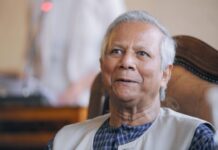
Despite differences over the 5 January election and good governance, the US has shown interest in consolidating ties with Bangladesh in the future. It wants to strengthen bilateral relations in anti-terrorism and security cooperation.
The US reiterated its request for Bangladesh to join the military campaign against the pro-Sunni militant Islamic State (IS), but Dhaka responded in the negative.
These issues were discussed at the Third Bangladesh-US Partnership Dialogue which ended in Washington yesterday. At the two-day dialogue, the Bangladesh side was led by foreign secretary Mohammed Shahidul Huq and the US side by US undersecretary of state for political affairs Wendy Sherman.
Development and good governance, trade and investment, security cooperation and other issues of bilateral and regional interest featured in the group discussions on the first day of the dialogue.
At the work session of the concluding say, the leaders of the two sides reviewed the progress made and also discussed issues of bilateral, regional and international cooperation pertaining to sustainable development, anti-terrorism, migration and climate change.
Speaking over cell phone from Washington to Prothom Alo yesterday, foreign secretary Mohammed Shahidul Huq said that at the partnership dialogue Wendy Sherman, and in a separate meeting US Assistant Secretary of State for South and Central Asian Affairs Nisha Desai Bisawal, had both stressed on the importance of relations between Bangladesh and the US. They both expressed hope that relations between the two countries would be further expanded and consolidated in the future.
About the election: Sources at the meeting report that the attitude of the US Congress and the Senate was critical concerning the 5 January election where more that held the candidates were elected uncontested and which BNP boycotted. This had cooled relations between Dhaka and Washington. Several members of the Bangladesh delegation, though, claim that relations had thawed during this dialogue.
They said that at the second partnership dialogue Wendy Sherman had in no uncertain terms called for dialogue between all parties and a free, fair and credible election. This time, however, the joint statement did not make mention of democracy, the election or the rule of law.
However, former Bangladesh ambassador to the US Humayun Kabir yesterday told Prothom Alo that the US felt that the 5 January election had destroyed Bangladesh’s previous image of a strong model for democracy. That is why the issues of democracy and politics remained unspoken at the dialogue. He said it was necessary for Bangladesh to discuss the issue of democracy. The failure to do so has hampered Bangladesh’s positive progress. In the joint statement, the US indirectly indicated the issue of political freedom by stressing the need to uphold the fundamental rights and rights of the citizens.
Security cooperation: The joint statement said that security cooperation between the two countries had increased over the past two months. The US is planning to send another vessel of the Coast Guard called USCGC to Bangladesh next year. It was said that US would continue its assistance to increase Bangladesh’s capacity to ensure maritime security.
US Army’s Pacific Command is providing several security forces of Bangladesh with anti-terrorism training. Bangladesh Navy’s special unit SWADS and Bangladesh Army’s first para-commando battalion (PCB), are included in this training.
The IS issue: Both sides at the dialogue expressed satisfaction at the anti-terrorism cooperation between the two countries. The US side raised the issue of IS and expressed their interest in Bangladesh’s participation in the anti-IS military campaign.
Foreign secretary Shahidul Huq denies that the US put any pressure on Bangladesh to join the anti-IS military campaign. He did admit, however, that the US reiterated its call to Bangladesh in this regard. The Bangladesh side said that it would not be possible at present to do so, though they would be willing to join any humanitarian programme in Iraq and Syria.
Source: Prothom Alo









